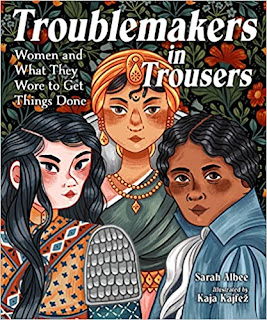Sarah Albee is the author of the new middle grade book Troublemakers in Trousers: Women and What They Wore to Get Things Done. Her many other books include Accidental Archaeologists. She lives in Connecticut.
Q: In Troublemakers in Trousers' Author's Note, you mention your own experiences with double standards for boys and girls--how much of a factor was that in your writing this book?
A: Author's notes are funny--I generally write them well after I've finished a book (usually when my editor reminds me), but they always turn out to be key to helping me understand my motivation to write a particular book.
So yes, I'm quite sure my early sense of indignation at double standards was a factor. I think half the population in the world knows that double standards exist, and I hope my young readers will fight for equity every chance they can.
Q: How did you choose the women to include in the book?
A: I started with a verrrry long list, and then sorted them chronologically, geographically, and finally by "profession."
I had a lot of 19th century women, so many of those got cut. I didn't want an overabundance of white European or Euro-American women, so I carefully picked just a few to leave space for others. I had a lot of soldiers/warriors, so I had to (painfully) cut most of them.
It was challenging, but I guess it's always better to have too much material than the other way around. But the ultimate criteria for inclusion in the book was that the woman had to have a super-cool story, and I feel very good about that!
Q: How did you research the book, and did you learn anything that especially surprised you?
A: As is usually the case when I start researching, I knew quite a bit about some women/historical eras, and next-to-nothing about others. I always learn things that surprise me when I do research.
I think the biggest surprise was for the final chapter, about Marguerite Johnson. I set out to find a Black Rosie the Riveter, because so many were erased from the historical record, and, well, I don't want to give away the surprise, but her story is quite an amazing one.
Q: You write, "We've come a long way, but there's still a lot further to go before women run an equal share of all countries, companies, armies, universities, sports teams, and movie studios." What do you see looking ahead, and what do you hope readers take away from the book?
A: I wrote the book pre-pandemic, and also before the Roe decision was struck down, but even so, I was feeling pretty dispirited about the state of the world in general. But, like most kidlit writers, I realized the best thing I could do to make the world a better place was to help inspire kids to grow up and enact changes.
Q: What are you working on now?
A: I have four nonfiction picture books in the pipeline! Two have been publicly announced--one is about the relationship between George Washington and his go-to portrait painter, Gilbert Stuart (they did not hit it off), and the other is about the history of rubber.
I also have a middle grade book about zero waste schools. That was a fun one to research, as I got to visit lots of schools and to witness some incredible programs.
Q: Anything else we should know?
A: I love to visit schools (see above), and have missed seeing kids in person these past two years. I am looking forward to restarting in-person school visits this year. Teachers/librarians--hit me up!
--Interview with Deborah Kalb. Here's a previous Q&A with Sarah Albee.


No comments:
Post a Comment